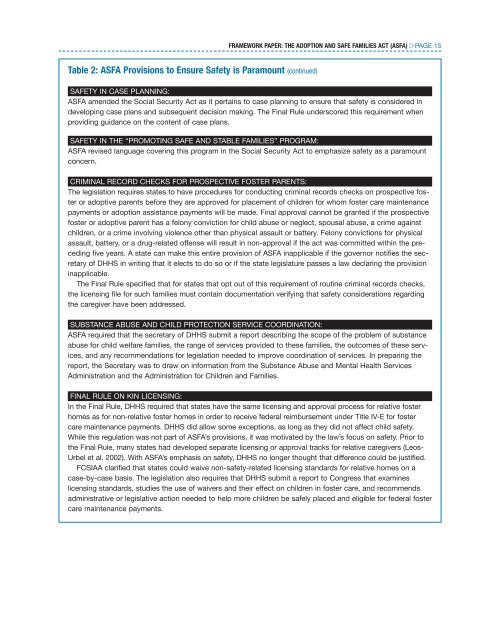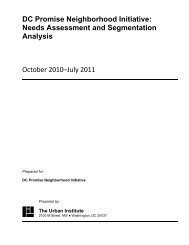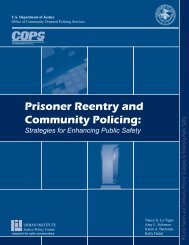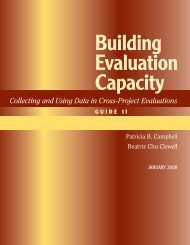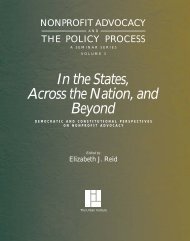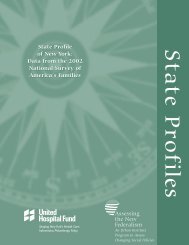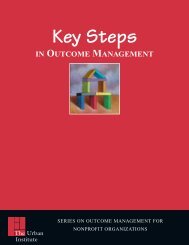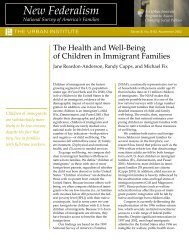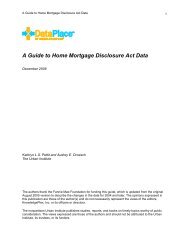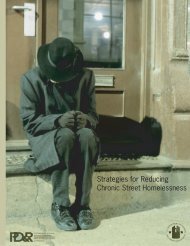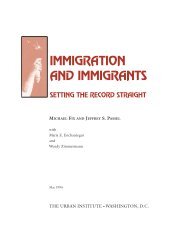Intentions and Results: A Look Back at the Adoption ... - Urban Institute
Intentions and Results: A Look Back at the Adoption ... - Urban Institute
Intentions and Results: A Look Back at the Adoption ... - Urban Institute
Create successful ePaper yourself
Turn your PDF publications into a flip-book with our unique Google optimized e-Paper software.
Table 2: ASFA Provisions to Ensure Safety is Paramount (continued)<br />
FRAMEWORK PAPER: THE ADOPTION AND SAFE FAMILIES ACT (ASFA) �PAGE 15<br />
SAFETY IN CASE PLANNING:<br />
ASFA amended <strong>the</strong> Social Security Act as it pertains to case planning to ensure th<strong>at</strong> safety is considered in<br />
developing case plans <strong>and</strong> subsequent decision making. The Final Rule underscored this requirement when<br />
providing guidance on <strong>the</strong> content of case plans.<br />
SAFETY IN THE “PROMOTING SAFE AND STABLE FAMILIES” PROGRAM:<br />
ASFA revised language covering this program in <strong>the</strong> Social Security Act to emphasize safety as a paramount<br />
concern.<br />
CRIMINAL RECORD CHECKS FOR PROSPECTIVE FOSTER PARENTS:<br />
The legisl<strong>at</strong>ion requires st<strong>at</strong>es to have procedures for conducting criminal records checks on prospective foster<br />
or adoptive parents before <strong>the</strong>y are approved for placement of children for whom foster care maintenance<br />
payments or adoption assistance payments will be made. Final approval cannot be granted if <strong>the</strong> prospective<br />
foster or adoptive parent has a felony conviction for child abuse or neglect, spousal abuse, a crime against<br />
children, or a crime involving violence o<strong>the</strong>r than physical assault or b<strong>at</strong>tery. Felony convictions for physical<br />
assault, b<strong>at</strong>tery, or a drug-rel<strong>at</strong>ed offense will result in non-approval if <strong>the</strong> act was committed within <strong>the</strong> preceding<br />
five years. A st<strong>at</strong>e can make this entire provision of ASFA inapplicable if <strong>the</strong> governor notifies <strong>the</strong> secretary<br />
of DHHS in writing th<strong>at</strong> it elects to do so or if <strong>the</strong> st<strong>at</strong>e legisl<strong>at</strong>ure passes a law declaring <strong>the</strong> provision<br />
inapplicable.<br />
The Final Rule specified th<strong>at</strong> for st<strong>at</strong>es th<strong>at</strong> opt out of this requirement of routine criminal records checks,<br />
<strong>the</strong> licensing file for such families must contain document<strong>at</strong>ion verifying th<strong>at</strong> safety consider<strong>at</strong>ions regarding<br />
<strong>the</strong> caregiver have been addressed.<br />
SUBSTANCE ABUSE AND CHILD PROTECTION SERVICE COORDINATION:<br />
ASFA required th<strong>at</strong> <strong>the</strong> secretary of DHHS submit a report describing <strong>the</strong> scope of <strong>the</strong> problem of substance<br />
abuse for child welfare families, <strong>the</strong> range of services provided to <strong>the</strong>se families, <strong>the</strong> outcomes of <strong>the</strong>se services,<br />
<strong>and</strong> any recommend<strong>at</strong>ions for legisl<strong>at</strong>ion needed to improve coordin<strong>at</strong>ion of services. In preparing <strong>the</strong><br />
report, <strong>the</strong> Secretary was to draw on inform<strong>at</strong>ion from <strong>the</strong> Substance Abuse <strong>and</strong> Mental Health Services<br />
Administr<strong>at</strong>ion <strong>and</strong> <strong>the</strong> Administr<strong>at</strong>ion for Children <strong>and</strong> Families.<br />
FINAL RULE ON KIN LICENSING:<br />
In <strong>the</strong> Final Rule, DHHS required th<strong>at</strong> st<strong>at</strong>es have <strong>the</strong> same licensing <strong>and</strong> approval process for rel<strong>at</strong>ive foster<br />
homes as for non-rel<strong>at</strong>ive foster homes in order to receive federal reimbursement under Title IV-E for foster<br />
care maintenance payments. DHHS did allow some exceptions, as long as <strong>the</strong>y did not affect child safety.<br />
While this regul<strong>at</strong>ion was not part of ASFA’s provisions, it was motiv<strong>at</strong>ed by <strong>the</strong> law’s focus on safety. Prior to<br />
<strong>the</strong> Final Rule, many st<strong>at</strong>es had developed separ<strong>at</strong>e licensing or approval tracks for rel<strong>at</strong>ive caregivers (Leos-<br />
Urbel et al. 2002). With ASFA’s emphasis on safety, DHHS no longer thought th<strong>at</strong> difference could be justified.<br />
FCSIAA clarified th<strong>at</strong> st<strong>at</strong>es could waive non-safety-rel<strong>at</strong>ed licensing st<strong>and</strong>ards for rel<strong>at</strong>ive homes on a<br />
case-by-case basis. The legisl<strong>at</strong>ion also requires th<strong>at</strong> DHHS submit a report to Congress th<strong>at</strong> examines<br />
licensing st<strong>and</strong>ards, studies <strong>the</strong> use of waivers <strong>and</strong> <strong>the</strong>ir effect on children in foster care, <strong>and</strong> recommends<br />
administr<strong>at</strong>ive or legisl<strong>at</strong>ive action needed to help more children be safely placed <strong>and</strong> eligible for federal foster<br />
care maintenance payments.


